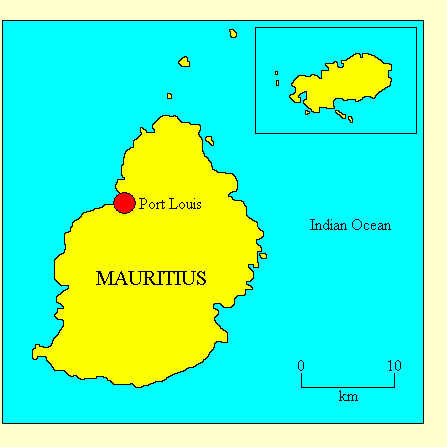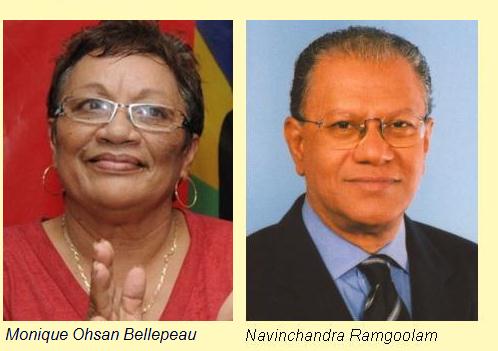
REPUBLIC OF MAURITIUS
• Official name: Republic of Mauritius
• Location: Indian Ocean
• International organisations: African, Caribbean and Pacific Group of States, African Union, Commonwealth of
Nations, Non-Aligned Movement, United Nations, World Trade Organisation.
• Borders: None
• Coastline: Indian Ocean
• Land area: 2,040 Km2
• Population: 1,290,000
• Annual GDP (PPP) per capita: US$12,400 (2009 CIA estimate). World ranking: 71

• Ethnicity: More than two-thirds of the population are of Indian descent, known as Indo-Mauritian. About a
quarter are of mixed French and African descent, known as Creoles. There are small Chinese and European (mainly French)
minorities.
• Languages: English is the official language and the language of business and the media. A French Creole is widely
spoken, and Hindi and Urdu are spoken in the Indo-Mauritian community.
• Religion: Hindu 52%, Catholic Christian 28%, Muslim 17%, other 3.1%
• Form of government: Parliamentary democratic republic. Mauritius is divided into nine districts and has three
dependencies (small Indian Ocean islands).
• Capital: Port Louis
• Constitution: The Constitution of the Republic of Mauritius
came into effect on 12 March 1968.
• Head of state: The President, chosen by the legislature for a five-year
term. The President's functions are largely ceremonial. President
Monique Ohsan Bellepeau has been Acting President
since 31 March 2012.
• Head of government: The Prime Minister, appointed by the President. The Prime Minister is the leader of the largest
party in the legislature and is accountable to it.
• Legislature: Mauritius has a unicameral legislature, the
National Assembly, which has 66 members serving five-year terms. Of these,
62 are elected from non-proportional multi-member constituencies. Up to eight additional members
are appointed by the Election Commission from the losing political parties.
• Electoral authority: The Electoral Commissioner's Office administers
national elections.
• Freedom House 2011 rating: Political Rights 1, Civil Liberties 2
• Transparency International Corruption Index: 52% (46 of 178 countries rated)
• Reporters Without Borders Press Freedom 2010 Index: 83% (54 of 178 countries rated)
• Heritage Foundation Economic Freedom 2010 Index: 77% (8 of 179 countries rated)

Political history
Mauritius was uninhabited when it was discovered by the Portuguese in 1505, and remained so until 1598, when the
Dutch took possession and named it after the Stadtholder Maurice of Nassau. The Dutch abandoned the island in 1707 and
in 1715 it was taken over by the French, who imported African slaves to work the plantations. In 1810 it was captured
by the British, who left the French settlers unmolested but abolished slavery and imported Indian workers in the place
of African slaves. Representative institutions began with a partly-elected government council in 1886, and there was a
fully-elected Legislative Assembly from 1947. Internal self-government was granted in 1961 and full independence
followed in March 1968.
Mauritian politics were dominated for many years by the moderate Mauritian
Labor Party (or Parti Travailliste) of Sir Seewoosagur Ramgoolam, the
first Prime Minister. But in 1982, the left-wing Mauritian
Militant Movement came to power under Anerood Jugnauth. The governing coalition split in 1983, with Jugnauth forming
the Mauritian Socialist Movement. Under Jugnauth Mauritius became
a republic in 1992. In 1995 the MLP returned to power under
Navinchandra Ramgoolam, son of Sir Seewoosagur, but at the next
elections in 2000, Jugnauth was returned to power. In 2003 he retired and became
President, being succeeded as Prime Minister by Paul Berenger, the first Creole Prime Minister. The
2005 election saw Ramgoolam return to office, and his government was returned with an increased majority in 2010.
Freedom House's 2011
report on Mauritius
says: "Mauritius is an electoral democracy. Since independence, voters have regularly chosen their representatives in
free, fair, and competitive elections... The country continues to enjoy a positive reputation for transparency and
accountability... The constitution guarantees freedom of expression. Several private daily and weekly
publications criticise both government and opposition politicians and their policies... Religious and academic
freedoms are respected. The rights to freedoms of assembly and association are honoured... The generally
independent judiciary, headed by the Supreme Court, administers a legal system that is an amalgam of French
and British traditions. Civil rights are for the most part well respected."
Updated May 2012
|

